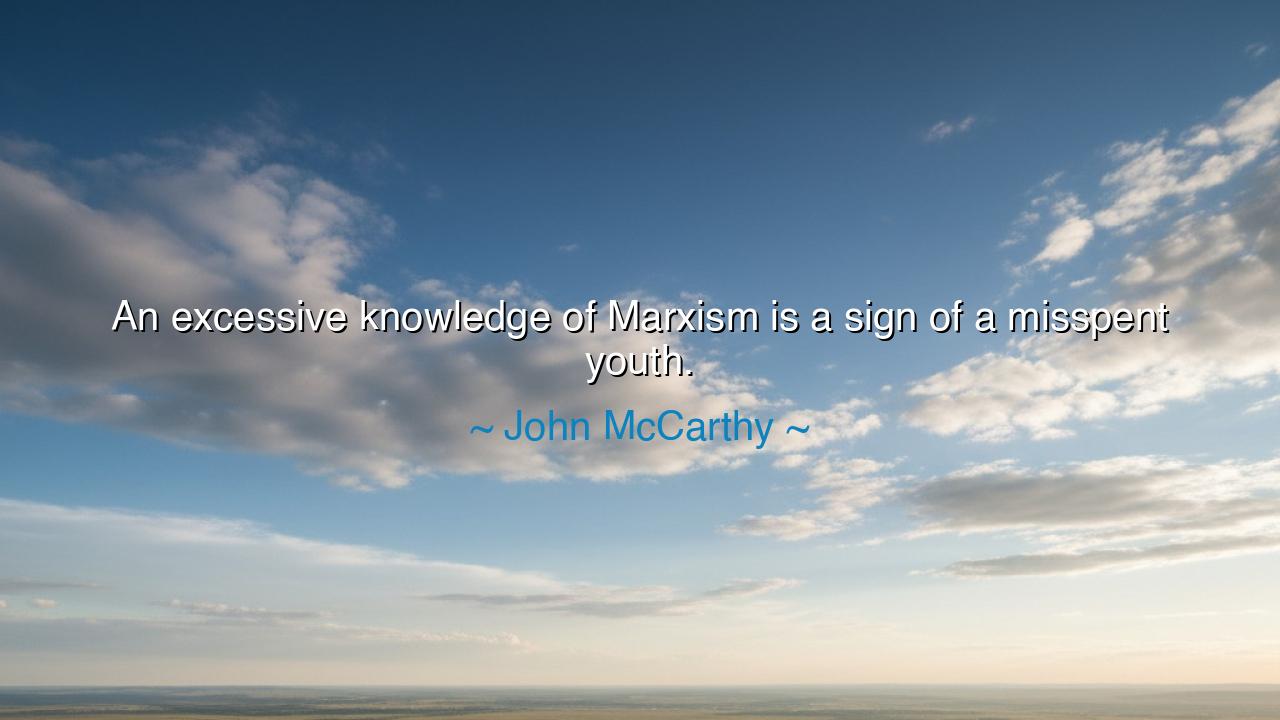
An excessive knowledge of Marxism is a sign of a misspent youth.






In the wry yet wise words of John McCarthy, the father of artificial intelligence, there resounds both humor and philosophy: “An excessive knowledge of Marxism is a sign of a misspent youth.” Beneath its irony lies a reflection on the restless passions of the young mind — the tendency of youth to chase ideologies with zeal, to grasp at grand systems that promise justice, equality, and meaning. McCarthy’s words are not an attack upon study or thought, but a gentle admonition against obsession — the kind of intellectual fervor that blinds rather than enlightens. For he speaks not only of Marxism, but of all belief systems that consume the young heart before it learns the virtue of balance.
The origin of this saying rests within the turbulence of the twentieth century, an age when ideology became a battlefield and millions were swept away by the storms of utopian dreams. McCarthy, a scientist of reason, lived through an era when the fires of Marxist idealism burned brightly across universities, promising liberation from greed and inequality. Yet he also witnessed the shadow of that dream — the cruelty of totalitarian states, the suppression of truth, the substitution of slogans for thought. To have an “excessive knowledge” of such a system, then, was to have spent one’s youth entangled in theory rather than truth, studying structures of revolution instead of the architecture of wisdom.
But let us not mistake McCarthy’s message for cynicism. The youth must dream, for it is in the fires of youth that great hearts are forged. What he warns against is excess — that seductive intoxication with ideology that can consume a person’s moral sight. Every age has its doctrines that promise to explain all, to save all, to divide the world neatly into heroes and villains. Yet those who cling too tightly to one vision often lose the capacity to see the world as it truly is. Wisdom begins where fanaticism ends — where one learns to question, to listen, and to balance justice with mercy, intellect with humility.
History offers countless examples. Consider the story of Arthur Koestler, once a devoted Marxist who believed Communism to be the final hope of mankind. He labored for years in service to the cause, blind to its errors, until the brutal realities of Stalin’s regime broke his faith. He saw innocent men imprisoned, truth twisted, and freedom sacrificed in the name of equality. Out of this disillusionment came his great novel Darkness at Noon, a cry against the tyranny of absolute ideology. Koestler’s youth, rich in passion yet spent in illusion, became the living proof of McCarthy’s warning — that to know an idea too deeply without questioning its morality is to lose one’s way in the labyrinth of abstraction.
There is, however, redemption in reflection. The one who emerges from ideological captivity often becomes a truer seeker of wisdom. For the mind that once bowed to a single system learns the necessity of freedom — the freedom to think, to doubt, to balance ideals with reality. McCarthy, as a scientist, understood this deeply. He valued inquiry over indoctrination, curiosity over conformity. His jest about “misspent youth” is thus a call to intellectual humility: to study widely, to question boldly, and to remember that no philosophy, no matter how noble, can replace the complexity of the human soul.
This lesson stretches far beyond Marxism. It speaks to all who are tempted by the simplicity of total answers — whether political, religious, or scientific. Beware, the ancients would say, of the mind that believes it has found the whole truth, for it is already closing its eyes to the greater mysteries. The purpose of knowledge is not to build walls of doctrine but to build bridges of understanding. The wise man does not drown in ideas; he walks upon them as stepping stones toward discernment.
Therefore, my listener, take this teaching as a lantern for your journey: Let your youth be spent not in devotion to any single creed, but in the pursuit of truth itself. Learn from every system, but be enslaved by none. Study the passions of history, yet keep your heart anchored in compassion. For the true measure of wisdom is not how much we know, but how clearly we see — that knowledge without humility is arrogance, and ideology without mercy is ruin. In this balance lies the difference between a misspent youth and a life well-lived: to seek not to master an idea, but to master oneself.






AAdministratorAdministrator
Welcome, honored guests. Please leave a comment, we will respond soon